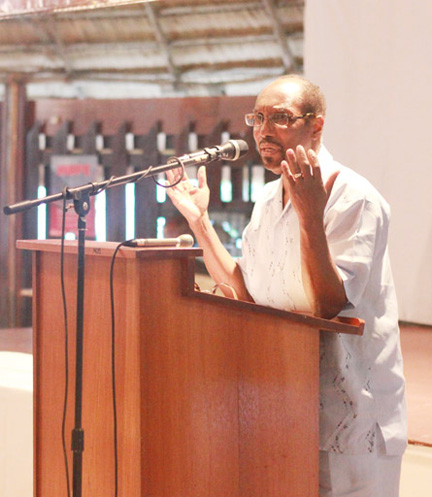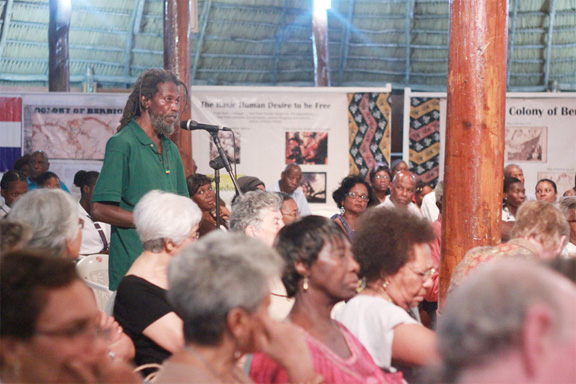Professor Emeritus Alvin Thompson has called for more statues to be erected in honour of individuals who have played instrumental parts in Guyana’s nation building, including former presidents Forbes Burnham and Cheddi Jagan.
“We have to address the sad reality that we have not paid nearly sufficient attention to the builders of our nation and we most certainly have not given them the honour they deserve,” Thompson said while delivering a lecture on Tuesday at the Umana Yana. The lecture titled “The Berbice Slave Uprising of 1763: Historical and Present-Day Significance” was the second in a three-part lecture series sponsored by the Culture Ministry to commemorate the 250th Anniversary of the 1763 Berbice Revolt.
Thompson lauded the initiative taken years ago to name Cuffy, the initial leader of the 1763 Berbice Slave Rebellion as a national hero, and the decision to honour him by erecting a statue in a prominent place. He noted that throughout the Americas, governments and private organizations are finding ways to honour people who rebelled against the slave system and who often lost their lives fighting against it.

But Thompson called for a widening of personalities who are honoured. “It is not only those who have struggled against slavery who deserve to be honoured in visual and other ways by the nation regardless of their ethnic or their ideology stance. We should welcome the images for trade unionist Hubert Critchlow and President Forbes Burnham. I consider it imperative to honour President Dr Cheddi Jagan, Richard Ishmael and…Sir Shridath Ramphal in statuary form in very prominent places in the capital city,” Thompson said. A statue of Critchlow has already been erected in the compound of the Public Buildings.
Speaking specifically about Dr Jagan, Thompson said that simply naming an airport or a building after him did not fully capture his contribution to the nation. “An airport or a building to honour Dr Jagan is fine but they do not tell the story of his struggles to achieve freedom and promote progress and dignity among the Guyanese people in the way at least it ought to be told,” he said.
Elaborating on the importance of statues, Thompson said that they remain in sight and are immovable making them difficult to ignore. Both locals and foreigners, he contended, have to recognise them and are often forced to ask questions about the contributions made by those depicted. Professor Thompson stressed that it was not good enough to merely erect statues but said that they ought to be properly maintained. He lamented that many of the statues to nationalist leaders in the region are neglected.
In addition to the erection of statues, Thompson said that paintings, videos and other initiatives should be undertaken so that persons can be informed about the contributions of these nation builders.
Speaking about the 1763 rebellion, Thompson stated it is by far the most important uprising in Guyana in terms of scale and significance. This rebellion started in Berbice in February 1763 and persisted for a little over one year. He noted that it is the first record of people in Americas managing to overthrow slavery and the system for a period of time.
He identified several important lessons from the revolt including the fact that “people should be treated as human beings with certain inalienable rights”. He also noted that “ethnic polarization is particularly dangerous since unlike national, political, economic, social, religious and other forms of identity, people cannot change their ethnic identities.”

Thompson, who is Guyanese born, has taught African and Caribbean History for over 40 years, first at the University of Guyana and then at the Cave Hill campus of the University of the West Indies. He is currently the editor of the Journal of Caribbean History, a position he has held since 1998.
The final lecture in the series is set for Thursday where Professor Verene Shepherd will address the topic: “United in Anger, United in War: Gender and Anti-Slavery in Caribbean History”.




